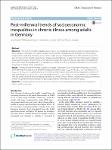Post-millennial trends of socioeconomic inequalities in chronic illness among adults in Germany
Hoebel, Jens
Kuntz, Benjamin
Moor, Irene
Kroll, Lars Eric
Lampert, Thomas
Objective: Time trends in health inequalities have scarcely been studied in Germany as only few national data have been available. In this paper, we explore trends in socioeconomic inequalities in the prevalence of chronic illness using Germany-wide data from four cross-sectional health surveys conducted between 2003 and 2012 (n = 54,197; ages 25–69 years). We thereby expand a prior analysis on post-millennial inequality trends in behavioural risk factors by turning the focus to chronic illness as the outcome measure. The regression-based slope index of inequality (SII) and relative index of inequality (RII) were calculated to estimate the extent of absolute and relative socioeconomic inequalities in chronic illness, respectively. Results: The results for men revealed a significant increase in the extent of socioeconomic inequalities in chronic illness between 2003 and 2012 on both the absolute and relative scales (SII2003 = 0.06, SII2012 = 0.17, p-trend = 0.013; RII2003 = 1.18, RII2012 = 1.57, p-trend = 0.013). In women, similar increases in socioeconomic inequalities in chronic illness were found (SII2003 = 0.05, SII2012 = 0.14, p-trend = 0.022; RII2003 = 1.14, RII2012 = 1.40, p-trend = 0.021). Whereas in men this trend was driven by an increasing prevalence of chronic illness in the low socioeconomic group, the trend in women was predominantly the result of a declining prevalence in the high socioeconomic group.
Dateien zu dieser Publikation
Keine Lizenzangabe

